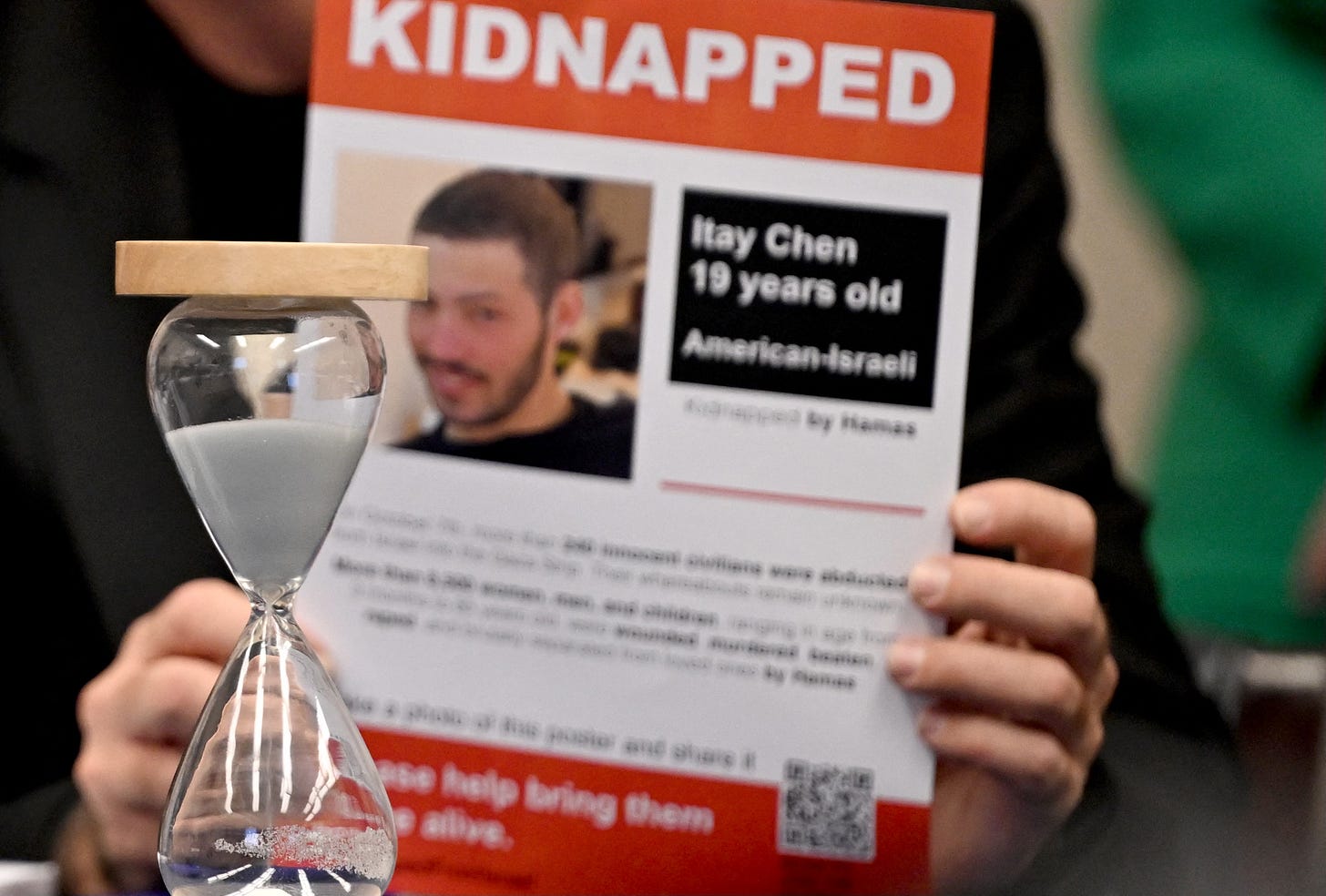Don’t Lose Focus on U.S. Hostages in Gaza

Omer Neutra. Hersh Goldberg Polin. Itay Chen.
These are the latest names in an anguished history of U.S. citizens detained by terrorists and hostile adversaries. In this case, 11 American citizens were kidnapped by Hamas on Oct. 7—the largest single group of Americans held hostage overseas since the 1979 Tehran embassy siege—and more than 30 Americans murdered. President Biden’s strong advocacy yielded the release of hostages over the past week, including four-year-old American Abigail Idan, but at least eight US hostages remain imprisoned in Gaza—“buried alive” in the words of one mother.
The families rightly fear that attention will shift elsewhere, and there is frustration that the majority of U.S. hostages, despite the Biden administration’s zealous engagement over the last six weeks, remain in captivity. There are several steps US officials, particularly on Capitol Hill, can take to help the U.S. hostages in Gaza and protect Americans everywhere.
While the complexities of hostage recovery are sadly familiar—agonizing uncertainty, endless search for pressure points on the hostage takers, painful coordination among parties with conflicting agendas—what’s different in this case is fear that the Gaza hostages’ fate will be subsumed in the broader Israeli-Palestine debate. These families are not only fighting a well-worn battle to keep attention on their loved ones—something with which the families of U.S. hostages in Iran, Syria, North Korea, and Russia are all too familiar—they must also wage an unparalleled campaign to ensure policymakers prioritize U.S. hostage recovery amidst conflicting perspectives on what’s happening on the ground in Gaza.
A rare point of agreement across administrations and political parties is the sacred duty to return Americans from unlawful captivity. That should remain the case here, regardless of party or views of the conflict.
First, Congress should voice strong support for and, if necessary, authorize additional funds for U.S. hostage cooperation efforts with Israel. U.S. Special Operations Command was borne from the embers of the disastrous 1980 operation to recover U.S. hostages in Iran. Over the last two decades, America’s special operations warriors perfected the ability to “find, fix, and finish” terrorists and recover or rescue Americans. The Pentagon deployed U.S. personnel to Israel immediately after October 7 to support hostage recovery efforts, and Congress should do whatever it can to make sure SOCOM is sufficiently resourced to help recover Americans held by Hamas.
Second, Congress should give the Biden administration space to negotiate with adversaries and partners. In hostage recovery, there’s always the question of whether to use a carrot or stick with those entities who communicate directly with the terrorists. In the Gaza context, there have been demands to sanction Qatar. Sanctions would be a mistake, however; Qatar is a lifeline for the hostages at the moment, and the administration is already taking strong steps to get the hostages back, epitomized by CIA Director Bill Burns’ latest trip to Doha. Before taking any action that could jeopardize America’s ability to rescue hostages held in Gaza, Congress should strengthen sanctions against Hamas directly.
Meanwhile, President Biden should continue to press the Qataris on the release of U.S. hostages specifically while publicly demanding the return of Americans and even threatening direct action against Hamas to get them back. At a certain point, all options should be on the table.
Third, as legal expert Carrie Cordero argued last month, Congress should reauthorize Section 702 authority. This law is a key tool that allows the intelligence community to collect communications from terrorists, hostile countries like China, and drug traffickers that cross through the United States. Fifty-nine percent of the president’s daily intelligence briefing stems from information collected under this legal authority, and it could provide critical support to current and future U.S. hostage recovery efforts. Congress has until Dec. 31 to renew the authority, and never has the case for renewal been starker.
Finally, we should not discount the power of symbols to give comfort to the hostage families and remind them the U.S. government has their backs. Members of Congress and the Biden administration should participate in the “Seats of Hope” campaign and reserve an empty seat at their tables this holiday season to “symbolize unity” with those detained.
Audiences are accustomed to seeing movies like Captain Phillips where Americans detained by terrorists are rescued heroically by the U.S. military. The hostages in Gaza should be seen in a similar light—Americans held by a violent terrorist group who deserve America’s military, diplomatic, and political support to set them free. Ideally, there will be a moment of freedom like we have seen with the other hostages released this past week, but until then American leaders can take important measures to make sure these hostages remain top of mind.
Daniel Silverberg is a managing director at Capstone, an adjunct senior fellow at the Center for a New American Security, and former national security advisor to Rep. Steny Hoyer of Maryland.

